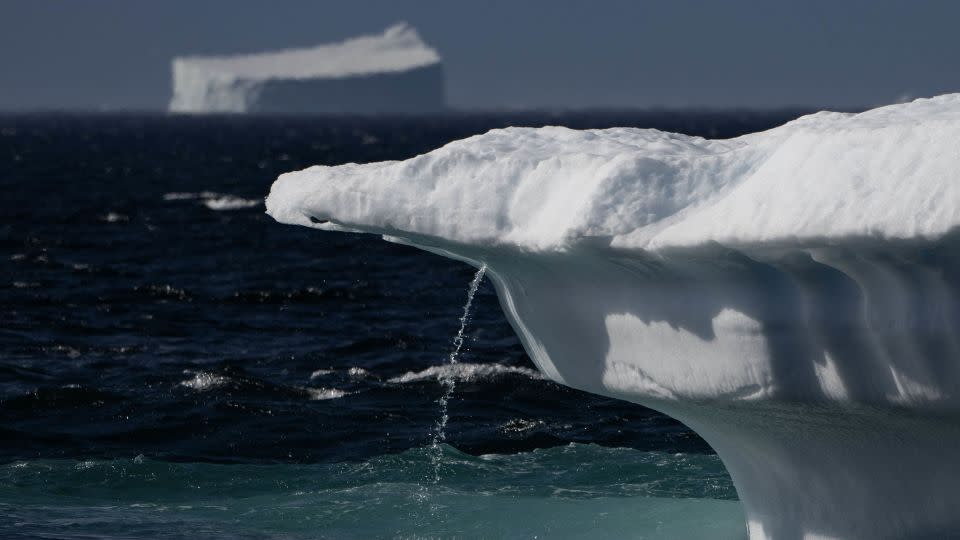One day in the next few years, everyone in the world will lose a second of their time. Exactly when this will happen is influenced by people, according to a new study; because melting polar ice changes the rotation of the Earth and changes time.
The hours and minutes that determine our days are determined by the Earth’s rotation. However, this rotation is not constant; It could change ever so slightly depending on what’s happening on the Earth’s surface and in its molten core.
These almost imperceptible changes mean that from time to time world times must be adjusted with “leap seconds”; This may seem small but can have a huge impact on computing systems.
Many seconds have been added over the years. But after a long trend of slowing down, Earth’s rotation is now accelerating due to changes in its core. The first time a second will need to be removed.
“Negative leap seconds have never been added or tested, so the problems it could create are unprecedented,” Patrizia Tavella, a member of the Time Department of the International Bureau of Weights and Measures in France, wrote in an article accompanying the study. .
But exactly when that will happen is affected by global warming, according to research published Wednesday in the journal Nature. The report found that melting polar ice has delayed the leap second by three years, pushing it from 2026 to 2029.
“Part of understanding what’s going to happen in global timekeeping depends on understanding what’s happening with the effect of global warming,” said Duncan Agnew, professor of geophysics at the University of California San Diego and author of the study.
Before 1955, a second was defined as the fraction of the time it took for the Earth to rotate once relative to the stars. Then came the era of highly accurate atomic clocks, which proved to be a much more stable way of defining a physical second.
Starting in the late 1960s, the world began using coordinated universal time (UTC) to set time zones. UTC is based on atomic clocks but still keeps pace with the rotation of the planet.
However, since the rotation speed is not constant, the two time scales gradually diverge. This means that an occasional “jump second” needs to be added to bring them back into alignment.
In the long term, changes in the Earth’s rotation were dominated by the friction of tides on the ocean floor, which slowed its rotation. Agnew said the effects of polar ice melt, caused by humans burning planet-warming fossil fuels, have recently become a major factor. As ice melts in the ocean, meltwater moves from the poles to the equator, further slowing the Earth’s rotation rate.
Ted Scambos, a glaciologist at the University of Colorado Boulder who was not involved in the research, likens the process to a figure skater spinning with her arms above her head. When they lower their arms towards their shoulders, their rotation slows down.
The melting of polar ice “is large enough to visibly affect the rotation of the entire Earth in an unprecedented way,” Agnew said. “To me, it’s really surprising that humans are causing the Earth’s rotation to change.”

But although melting ice may be slowing the Earth’s rotation, there is another factor in global timekeeping, according to the report: processes in the Earth’s core.
The planet’s liquid core rotates independently of its solid outer shell. If the core slows down, the solid shell accelerates to maintain momentum, and that’s what’s happening now, Agnew said.
Little is known about what’s going on about 2,800 miles below the Earth’s surface, and it’s not clear why the core’s speed is changing. “It’s fundamentally unpredictable,” Agnew said.
But what is clear, according to the research, is that although melting polar ice has a slowing effect, Earth’s rotation is accelerating overall. This means the world will soon need to extract a second for the first time.
“One second doesn’t seem like much,” Agnew said, but computing systems built for activities such as stock market transactions need to be accurate to within a thousandth of a second.
Many computer systems have software that allows you to add a second, but very few have the ability to subtract a second. People will need to reprogram computers, introducing the potential for errors.
“No one really expected that the Earth would accelerate to the point where we might have to eliminate a leap second,” Agnew said.
Scambos, a glaciologist at the University of Colorado Boulder, said the “most important” feature of the study was that it showed that “even as ice loss has increased, changes in the Earth’s core now trend toward greater trends in ice loss from the poles.” in last decade.”
“For some computer applications, this is the ‘no’ moment,” he told CNN, but for most people, life will continue as usual.
According to Agnew, the findings could be a powerful tool to connect people with the ways humans are changing the planet.
“To be able to say that so much ice is melting and that it’s actually changing the Earth’s rotation by a measurable amount, I think it makes you feel like, OK, this is a big deal.”
For more CNN news and newsletters, create an account at CNN.com